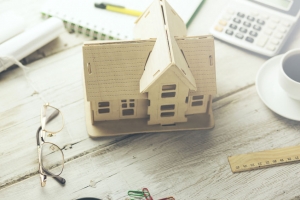
There is a common misconception that someone who is self-employed will not have the tax records or income necessary to qualify for a mortgage; however, that is not necessarily the case. In reality, if you are self-employed, there are a lot of home loan options available to you. It is true that it might require some additional paperwork and planning, but as long as you have the necessary information, you should be able to qualify for a mortgage.
What Is Necessary To Qualify For A Self-Employed Mortgage Loan?
If you are interested in taking out a mortgage when you are self-employed, you will be held to the same standards as everyone else. This means that the lender is going to require a solid credit score, a long credit history, a favorable debt-to-income ratio, and enough money to cover the down payment. In addition, you will also have to demonstrate a solid income history, just like everybody else.
That is where the difference comes into play. A W-2 employee may be able to provide a few pay stubs, but someone who is self-employed may be required to provide up to two years of self-employment income.
How Do I Maximize My Chances Of Getting Approved?
If you are self-employed and want to maximize your chances of getting approved for a self-employed mortgage, there are a few steps you should take. First, you need to make sure your debt-to-income ratio is as low as possible. That way, you can reduce the risk to the lender. You can also improve your chances by preparing financial documents ahead of time. That might mean including profit and loss statements, two years of tax returns, and 2 years of business taxes if you have them. Do not forget that improving your credit score and putting more money down can improve your chances of getting approved.
Lengthen Your Income History
Finally, if you are serious about getting approved, lengthen your income history. Show that you are willing to provide a longer track record of income, and the bank will feel better about providing you with a self-employed mortgage loan. That way, you have the financing to purchase the house of your dreams.

 If you are in the process of looking for a new home, you need to find the right one to meet your needs. Sometimes, you want to learn more about specific properties before you decide if it is right for you. As a result, a lot of prospective buyers will include contingencies in their home offers that may allow them to back out without losing their earnest money. What are a few examples of loan contingencies, and how can you use them to protect yourself during the process?
If you are in the process of looking for a new home, you need to find the right one to meet your needs. Sometimes, you want to learn more about specific properties before you decide if it is right for you. As a result, a lot of prospective buyers will include contingencies in their home offers that may allow them to back out without losing their earnest money. What are a few examples of loan contingencies, and how can you use them to protect yourself during the process?  The whole idea of investing is to use a portion of your money now to get more down the road. It is important for everyone to diversify their investments, and you might be thinking about buying a second house to do so. Investing in real estate is a goal that a lot of people have, but how can you get started? It was challenging enough to buy your first house, so how can you afford a second one?
The whole idea of investing is to use a portion of your money now to get more down the road. It is important for everyone to diversify their investments, and you might be thinking about buying a second house to do so. Investing in real estate is a goal that a lot of people have, but how can you get started? It was challenging enough to buy your first house, so how can you afford a second one?  Members of the military, their family members, and veterans have access to a unique mortgage option called a VA loan. This can be a strong option because it provides borrowers with an opportunity to purchase a house for less than 20 percent down. While not everyone is eligible for a VA loan, there are a lot of people who are wondering, are VA loans assumable? There are a few key points to keep in mind.
Members of the military, their family members, and veterans have access to a unique mortgage option called a VA loan. This can be a strong option because it provides borrowers with an opportunity to purchase a house for less than 20 percent down. While not everyone is eligible for a VA loan, there are a lot of people who are wondering, are VA loans assumable? There are a few key points to keep in mind. After you have found the right house to meet your needs, you need to make the down payment to complete the transaction. Can you show up at the closing table with a suitcase full of cash? Of course, that would be a bit suspect, so that is not actually how it happens. What do you need to do to actually hand over the funds to buy the house?
After you have found the right house to meet your needs, you need to make the down payment to complete the transaction. Can you show up at the closing table with a suitcase full of cash? Of course, that would be a bit suspect, so that is not actually how it happens. What do you need to do to actually hand over the funds to buy the house?  There is a good chance you have heard someone described as being house poor. What exactly does it mean? It is important to understand what it means to be house poor and how you can stay away from it.
There is a good chance you have heard someone described as being house poor. What exactly does it mean? It is important to understand what it means to be house poor and how you can stay away from it. If you are in the process of purchasing a home, it is critical for you to make sure that you budget appropriately. Unfortunately, there are a lot of people who commonly overlook closing expenses. Even though it is important for you to have enough money for your down payment, you need to make sure you cover closing costs as well. What is included in closing costs, and how much money do you need to budget?
If you are in the process of purchasing a home, it is critical for you to make sure that you budget appropriately. Unfortunately, there are a lot of people who commonly overlook closing expenses. Even though it is important for you to have enough money for your down payment, you need to make sure you cover closing costs as well. What is included in closing costs, and how much money do you need to budget? If you’re at the stage in life where home ownership is nearly within your reach, you’re probably wondering whether you should start looking for a home or whether you should just keep renting. Renting is easier, people say, and it gives you more mobility. But over the long term, all that rent money can really add up – and it eventually reaches a point where buying a home is a better deal.
If you’re at the stage in life where home ownership is nearly within your reach, you’re probably wondering whether you should start looking for a home or whether you should just keep renting. Renting is easier, people say, and it gives you more mobility. But over the long term, all that rent money can really add up – and it eventually reaches a point where buying a home is a better deal. There are not many parts of your life that are private anymore. Today, it is relatively easy for someone to go online and look up your address in just a few minutes. At the same time, there are some people who have an easier time keeping their lives private. Celebrities, public officials, and other people who are frequently in the public light are able to conceal their addresses. Even if you aren’t famous, what do you need to do to hide your address?
There are not many parts of your life that are private anymore. Today, it is relatively easy for someone to go online and look up your address in just a few minutes. At the same time, there are some people who have an easier time keeping their lives private. Celebrities, public officials, and other people who are frequently in the public light are able to conceal their addresses. Even if you aren’t famous, what do you need to do to hide your address?
